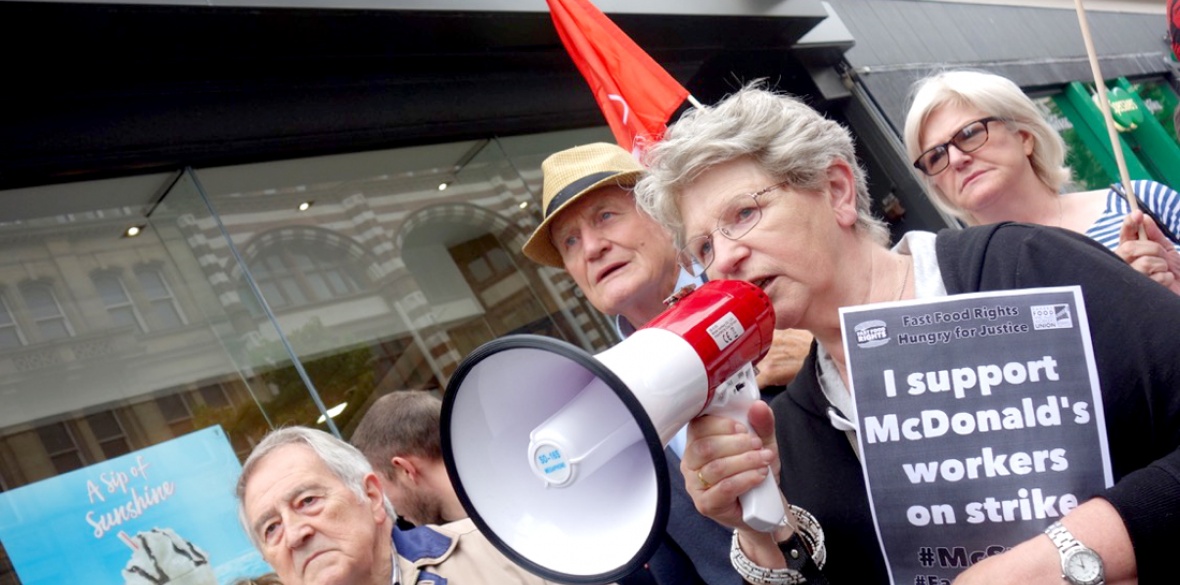This is the last article you can read this month
You can read more article this month
You can read more articles this month
Sorry your limit is up for this month
Reset on:
Please help support the Morning Star by subscribing here
PENSIONERS UNITED opens with Tony Benn describing the NHS as “pure socialism.” This marks the fundamental theme of Hazuan Hashim and Phil Maxwell’s 90-minute documentary.
Using extensive footage and interviews with grassroots campaigners, the film argues that we’re in a critical fight to defend the post-war welfare state.
The fact that most of the people making that argument are old enough to have seen dramatic changes in our society only adds weight.
The primary focus of the film is Liverpool and its deep culture of political resistance.
Benn’s tribute to the NHS is enacted by the vibrant local campaign to save the city’s women’s hospital.
This is one example of many in the film where working-class consciousness has a vision beyond the limits of the political and bureaucratic establishment.
At a time when women’s rights are regularly but superficially discussed in the mainstream media, it is the women of Liverpool who are fighting to defend a pioneering specialist health and maternity service.
The importance of their struggle is amplified by 95-year-old Harry Leslie Smith who remembers a time before the NHS and the damage it caused to working-class lives.
Pensioners United links the fight to save our NHS to campaigns against ruinous PFI schemes.
In fly-on-the-wall scenes from angry meetings, the film illustrates the arrogance of politicians (some of them from the Labour Party) who have tamely accepted the privatisation of public services.
As one elderly audience member succinctly puts it: “No Labour person should ever collaborate with Tories.”
Such simple but profound political truths, expressed by people with wisdom born of experience, litter the film.
Among its main strengths is that it allows these voices to speak for themselves, without editorial embellishment.
One of the film’s most important messages is that we mustn’t allow our enemies to divide us by sex, ethnicity or age.
Unions play a vital role in this. Today’s struggles, both inside and outside the workplace, can be manipulated by employers to set older workers against younger ones.
Recent industrial disputes by the UCU and RMT show that unions can successfully appeal to a wider set of values which improve pay, pensions and conditions for today’s workers and tomorrow’s.
The film shows members of the Merseyside Pensioners Association campaigning in support of striking McDonald’s staff and encouraging all young workers to “join a union.”
This vision of a more humane and equal society is captured in Pensioners United by the hugely effective “Total Eclipse of The Sun” campaign in Liverpool, following the paper’s vile coverage of the Hillsborough tragedy.
In a moving sequence, the film draws an important parallel between Hillsborough and Grenfell in the words inscribed on an art installation: “Two cities, one fight for justice.”
The film moves to London and links the Grenfell atrocity to the battle to defend council housing.
Hashim and Maxwell interview 94-year-old Sophie Spielman whose estate in Whitechapel was threatened with demolition, until residents got organised and put the council’s plans on hold.
Spielman expresses incredulity that her community could be lost as waves of profit-seeking private property development crash over the East End.
The same area provides the setting for the testimonies of Beattie Orwell and Max Levitas, both over 100, who recall the Battle of Cable Street on October 4 1936.
With profound relevance for today, Levitas explains how the Jewish Board of Deputies tried to discourage people from protesting against Mosley’s fascist Blackshirts and advised them to “stay indoors.”
Instead, the labour and trade union movement mobilised alongside the Jewish community — “unity in action” as Max calls it — to score a historic victory over the forces of reaction and bigotry.
Fighting anti-semitism and racism is the proudest tradition of our movement, something that Jeremy Corbyn personifies.
Pensioners United captures Corbyn speaking at the 100th anniversary of the Battle of Cable Street and its “deep personal significance” for him.
Through choking emotion, he describes his mum’s memories of being there in 1936, defending the Jewish community while the Board of Deputies stayed away.
It’s a grotesque perversion of history that today’s Jewish establishment should accuse her son of being anti-semitic.
Billy Bragg once sang that “nostalgia is the opium of the age.”
There are real dangers in romanticising and mythologising the history of the labour movement. But as Pensioners United makes clear, we ignore that history at our peril.
The film honours some of the events and people that mark the best tradition of working class struggle and solidarity. But above all, it says that after they’re gone, we need to keep that spirit alive.
Details of screenings and more information can be found on the “Pensioners United” Facebook page.











